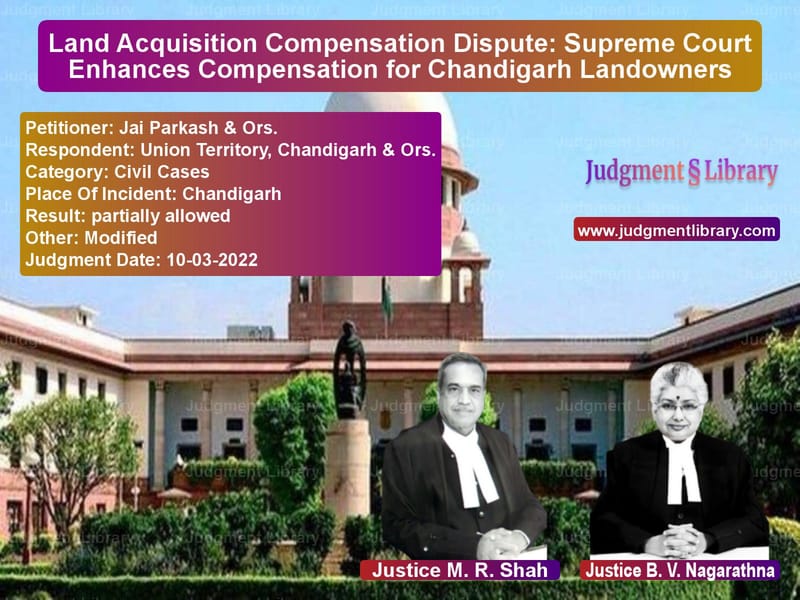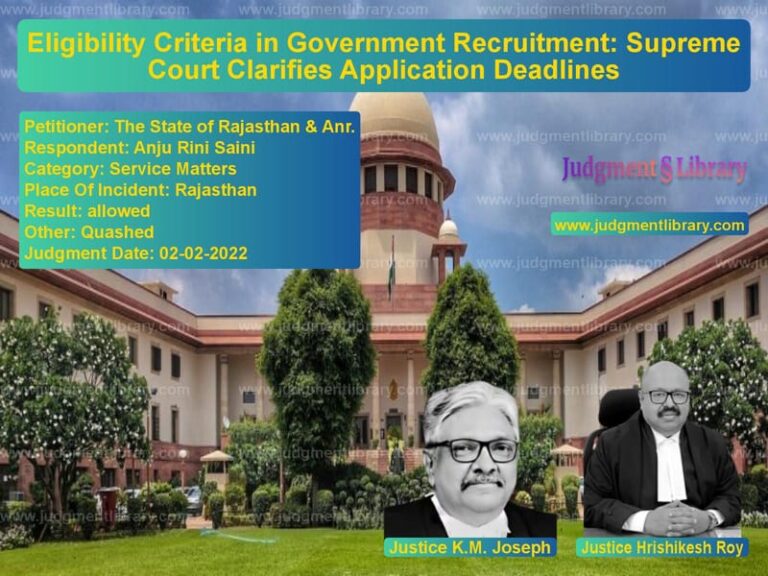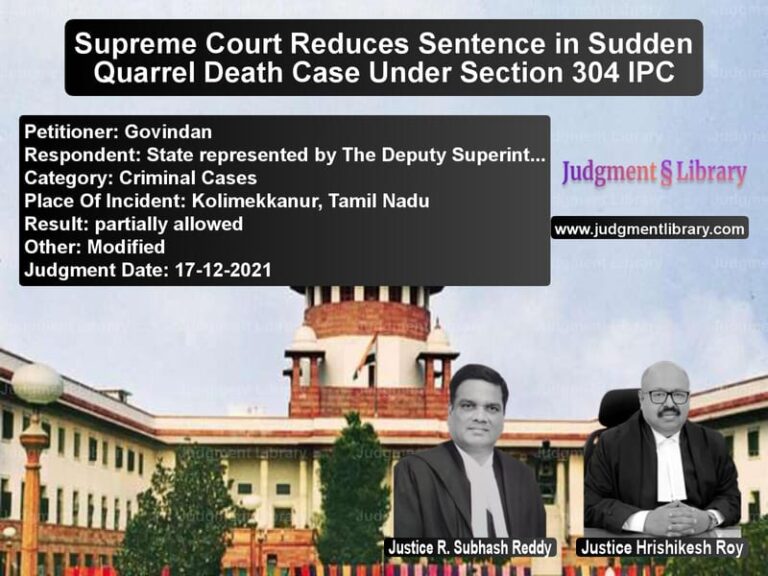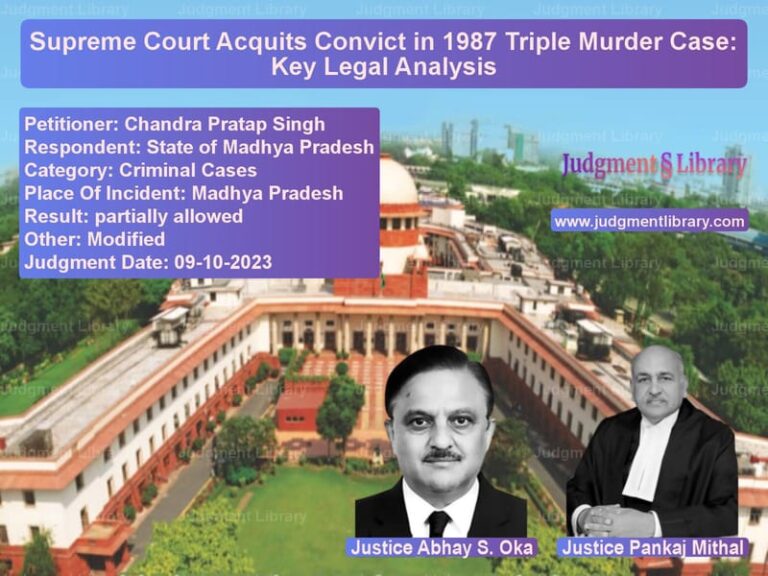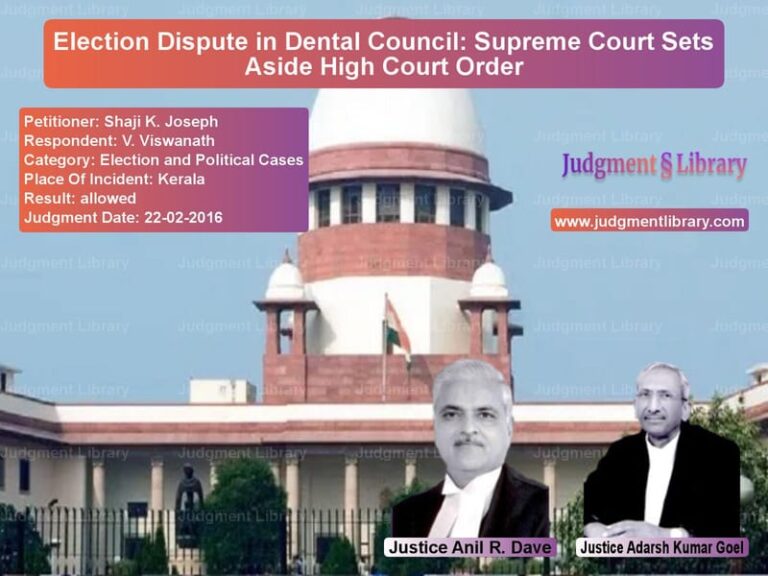Land Acquisition Compensation Dispute: Supreme Court Enhances Compensation for Chandigarh Landowners
The case of Jai Parkash & Ors. vs. Union Territory, Chandigarh & Ors. revolves around the dispute regarding compensation awarded for land acquisition in Chandigarh. The Supreme Court addressed the question of whether the compensation determined by the High Court was fair and whether a lower deduction percentage should have been applied while calculating the market value of the acquired land.
This judgment highlights the legal complexities in land acquisition cases and how courts assess compensation by balancing government interests and the rights of landowners.
Background of the Case
The dispute originated from a notification issued on March 19, 1999, under Section 4 of the Land Acquisition Act, 1894. The Chandigarh Administration sought to acquire:
- 30.78 acres of land in Village Hallo Majra, Hadbast No. 219
- 32.92 acres of land in Village Behlana, Hadbast No. 231
The purpose of this acquisition was for use by the Defence Security Forces. Subsequently, a notification under Section 6 of the Land Acquisition Act was issued on March 23, 1999. The Land Acquisition Officer assessed the market value of the land and awarded compensation of Rs.6,87,837 per acre.
Feeling dissatisfied with the compensation, landowners sought reference before the court. The Reference Court revised the compensation to Rs.9,65,000 per acre. However, this amount was still challenged by the landowners, leading to an appeal before the Punjab and Haryana High Court.
High Court’s Decision
The Punjab and Haryana High Court, in its judgment, reviewed sale deeds submitted by the landowners, particularly:
- Exhibit P-73
- Exhibit P-74
The High Court held that these sale deeds were relevant and should have been considered by the Reference Court while determining compensation. The High Court took the average price from these sale deeds and arrived at a rate of Rs.22,57,000 per acre. However, applying a 50% deduction, the final market value of the land was determined to be Rs.11,30,000 per acre.
The landowners challenged this decision before the Supreme Court, arguing that the 50% deduction was excessive and that a lower percentage should have been applied.
Arguments of the Petitioner (Landowners)
The landowners contended that:
- The High Court erred in applying a 50% deduction without justification.
- The sale deeds relied upon had already established the market rate at Rs.22,57,000 per acre.
- Given the location of the acquired land, which abuts National Highway No. 21, the deduction should have been lower.
- The compensation should be increased to reflect the true market value.
Arguments of the Respondent (Chandigarh Administration)
The Chandigarh Administration argued that:
- The deductions were necessary as the land acquired was significantly larger than the small plots reflected in the sale deeds.
- The High Court’s assessment was reasonable, and no further enhancement was justified.
- Since the land was acquired for public purposes, the valuation should consider government policies and planned development.
Supreme Court’s Observations
The Supreme Court, presided over by Justices M.R. Shah and B.V. Nagarathna, carefully examined the arguments. The Court noted that:
- The High Court’s reliance on Exhibit P-73 and Exhibit P-74 was valid, and the market rate of Rs.22,57,000 per acre was appropriate.
- The land in question was located near National Highway No. 21, which increased its market value.
- Applying a 50% deduction was excessive, as it was not supported by any detailed reasoning.
- A more reasonable deduction percentage should be 40% instead of 50%.
The Court also acknowledged that the landowners had waited long for a fair compensation determination and that the case should not be remanded to the High Court for further hearings, as it would lead to further delays.
Supreme Court’s Verdict
Based on these observations, the Supreme Court ruled as follows:
- The deduction for land size should be 40% instead of 50%.
- The revised compensation was set at Rs.13,54,200 per acre, up from Rs.11,30,000 per acre.
- The landowners were entitled to all statutory benefits available under the Land Acquisition Act on the enhanced compensation.
- In the case of appellants in Civil Appeal Nos. 1805-1806 of 2022 (arising from RFA No. 1253 of 2004), interest on the enhanced amount was not granted for the period of 1033 days’ delay in filing the Special Leave Petition before the Supreme Court.
The Supreme Court concluded:
“Looking to the location and the purpose for which the lands have been acquired, in the peculiar facts and circumstances of the case, we are of the opinion that if a deduction of 40% is applied instead of 50% as applied by the High Court, it will meet the end of justice and it can be said to be a fair market value for the acquired lands.”
Conclusion
This ruling provides significant clarity on how courts determine compensation in land acquisition cases. The judgment demonstrates that:
- Land valuation must consider real market conditions.
- Unjustified deductions in compensation can be challenged.
- The proximity of land to key infrastructure (such as highways) plays an essential role in valuation.
- Delays in litigation can impact interest payments on compensation.
The Supreme Court’s decision ensures that landowners receive a more just and reasonable compensation for their acquired property, setting an important precedent for future land acquisition cases.
Petitioner Name: Jai Parkash & Ors..Respondent Name: Union Territory, Chandigarh & Ors..Judgment By: Justice M. R. Shah, Justice B. V. Nagarathna.Place Of Incident: Chandigarh.Judgment Date: 10-03-2022.
Don’t miss out on the full details! Download the complete judgment in PDF format below and gain valuable insights instantly!
Download Judgment: jai-parkash-&-ors.-vs-union-territory,-cha-supreme-court-of-india-judgment-dated-10-03-2022.pdf
Directly Download Judgment: Directly download this Judgment
See all petitions in Property Disputes
See all petitions in Damages and Compensation
See all petitions in Landlord-Tenant Disputes
See all petitions in Specific Performance
See all petitions in Judgment by Mukeshkumar Rasikbhai Shah
See all petitions in Judgment by B.V. Nagarathna
See all petitions in partially allowed
See all petitions in Modified
See all petitions in supreme court of India judgments March 2022
See all petitions in 2022 judgments
See all posts in Civil Cases Category
See all allowed petitions in Civil Cases Category
See all Dismissed petitions in Civil Cases Category
See all partially allowed petitions in Civil Cases Category

